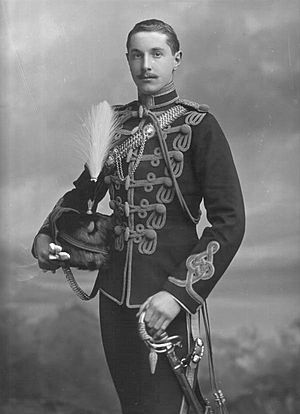Arthur Maxwell, 11th Baron Farnham facts for kids
Arthur Kenlis Maxwell (born October 2, 1879 – died February 5, 1957) was known as the 11th Baron Farnham. He was an officer in the British Army. He also served as an Irish Representative Peer, meaning he represented Ireland in the British Parliament.
Contents
Early Life and Family
Arthur's father was the 10th Baron Farnham. His mother was Lady Florence Jane Taylour. When his father passed away in November 1900, Arthur became the 11th Baron Farnham. He also inherited the family's estate, called the Farnham Estate, in County Cavan, Ireland.
Arthur married Aileen Selina Coote on October 8, 1903. They had a son named Somerset. Sadly, Somerset died in 1942 during the Battle of El Alamein in World War II. Because of this, when Arthur passed away in 1957, his titles and estate went to his grandson, Barry.
Military Service
Arthur studied at the Royal Military Academy Sandhurst. He joined the 10th Hussars regiment as a Second Lieutenant in 1899.
The Second Boer War
His regiment went to South Africa to fight in the Second Boer War in late 1899. Arthur joined them in March 1900. He traveled there on a ship called the SS British Prince. Soon after arriving, he was promoted to Lieutenant. After the war ended in 1902, his regiment moved to India. Arthur traveled with nearly 375 other soldiers to Bombay (now Mumbai). They were then stationed in a place called Mhow.
First World War
During the First World War, Arthur was a Lieutenant-Colonel. He led a group called the North Irish Horse. For his service in World War I, he received the Distinguished Service Order (DSO) in 1918. This award is given for bravery and leadership in battle.
Political Role
In December 1908, Arthur was chosen to be an Irish Representative Peer. This meant he had a seat in the House of Lords in the British Parliament. He was part of a political group called the Irish Unionist Alliance. This group wanted Ireland to remain part of the United Kingdom.
Arthur became a leader for Southern Unionists after 1919. The group stopped working after the Anglo-Irish Treaty in 1921. This treaty led to the creation of the Irish Free State.
Standing Up for His Beliefs
Arthur was very loyal to Britain. Even after the treaty, he made sure the British national anthem, "God Save the King," was played at events at his home, Farnham Castle. This was unusual in Ireland at the time. It showed his strong belief in the union between Ireland and Britain.
 | Laphonza Butler |
 | Daisy Bates |
 | Elizabeth Piper Ensley |


